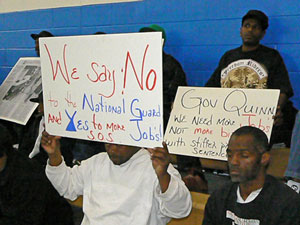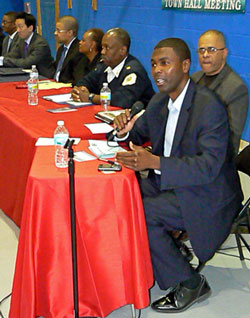Call for National Guard policing divides community
By LaRisa Lynch Contributing Writer | Last updated: May 25, 2010 - 10:34:05 AMWhat's your opinion on this article?
- Urban violence brings renewed calls for National Guard deployment (FCN, 05-07-2010)

Chicago residents attend a meeting and oppose having National Guard involvement in law enforcement. Photos: LaRisa Lynch
‘To bring people in who have been dealing with Afghanistan and Iraq mentality to an urban area to deal with young kids would do nothing but beget more violence.’ —Warren Riley, Retired U.S. Air Force officer |
“I don't mind taking heat for an issue that could possibly improve the lives of people. That's why I ran for office,” Mr. Ford told The Final Call. “You can't play it safe at all times.”
But the licks Mr. Ford has taken shows how divisive the issue of bringing in the National Guard to augment police is within the Black community.
According to the Cook County coroner's office, Chicago has had 136 homicides to date of which, 112 where Blacks, 12 were under the age of 17 and 100 were over the age of 18. Whites and Latinos were grouped together for a total of 24 homicides victims. Six of those were under the age of 17 and 18 were over 18. 26 of the homicide victims were Chicago Public Schools students shot during the 2009-2010 school year.
Residents who packed a recent forum on the issue want jobs more than the National Guard while others cited the number of children killed as a reason to bring them here. Yet others called for more parental accountability.
But the drastic call to use the National Guard got Mr. Ford one thing he wanted—a discussion on violence prevention.
“There is nothing wrong with the National Guard sitting down with the mayor and saying ‘we can help you,' ” Mr. Ford told a crowd of nearly 250 residents.
The city has had more murders than the number of soldiers killed in both Iraq and Afghanistan for this year alone. And while Chicago saw an 11 percent decline in violent crime, homicides increased by eight percent. Additionally, the Chicago Police Department is short 2,000 officers.
Comenecia O'Neal, 32, believes bringing in the National Guard is the right thing to do. Ms. O'Neal lives in the west side community of Austin, which has seen its fair share of violence.
“I'm for it, if it is going to stop the drugs and crime,” said the mother of three daughters.
Fellow Austin resident Dessi Roberson also wants the National Guard. She hoped it would stop youth on youth violence. But when asked if the guardsmen are the right choice given its history during the civil rights era, the 76-year-old said Chicago is different from down South.
“I would definitely like to have the National Guard come in to give us a hand,” Ms. Roberson said.
But high school student Andre Fulton does not. The 16-year-old, who attends Austin Business and Entrepreneurialship Academy, knows violence is up, but believes it has been overblown by the media. He added that bringing in “trained killers” would just intimidate teens and further exasperate the problem.
“You are going to have to get the guns off the streets. If you can't stop the gun trade, then you can't stop the violence,” said Mr. Fulton, whose 16-year-old cousin was injured in gang crossfire last year while another friend was killed weeks ago.

State Rep. LaShawn Ford explains his reasoning for bringing in the National Guard.
|
“Do you want your kid who is doing well in school to be subjected to armed guards walking around the community like he's in a police state?” Mr. Hardiman asked.
He contends the National Guard should be a last resort after efforts to address poverty, unemployment and discrimination have been exhausted.
Retired U.S. Air Force officer Warren Riley, 44; contends a military presence would only create an oppressive atmosphere that would make people feel like their backs are up against a wall.
“To bring people in who have been dealing with Afghanistan and Iraq mentality to an urban area to deal with young kids would do nothing but beget more violence,” said Mr. Riley, who served in Saudi Arabia and Africa.
He contends the city's pervasive violence stems from the demolition of public housing developments. Gangs, he explained, are now interspersed throughout the city and are fighting for “turf.”
Community activist Reginald Akkem Berry contends clamping down on gangs, drugs and guns won't end violence, but creating jobs could. Mr. Berry, who served 18 years in prison, created Saving Our Sons to provide young men ages 15 to 30 with alternatives to selling drugs to earn a living. His organization found jobs for 21 young people “who would ordinarily be out there hustling,” said Mr. Berry, a former gang chief for the Four Corner Hustlers.
“We believe if you give them an alternative rather than an ultimatum, then these kids would be out here doing something different,” he said.
Houston Sherrod, 18, agreed. Young Sherrod was expelled from school at 17 and a felony conviction soon followed. His background prevented him from finding work so he took to the streets.
“I just did everything that I saw my older siblings do—stand on the corner trying to get some money. I couldn't do anything else,” Mr. Sherrod said. “That is not the life a kid wants to live.”
Rep. Ford understands the push for jobs, but he said there is a correlation between economic development and security.
“Businesses will not invest in communities where crime is high,” Rep. Ford said.
The idea of the National Guard has gotten a lukewarm reaction from public officials, including Mayor Daley. The mayor's office did not return calls seeking comment, but published reports indicated that Mayor Daley hasn't ruled out the idea, saying it is “something to think about.” Mr. Daley's stance represents a shift from when former Gov. Rod Blagojevich in 2008 considered bringing in state troopers or guardsmen to quash a spike in violence. Mayor Daley, at that time, frowned on the idea.
Illinois Governor Pat Quinn was coy with his response. He threw the ball on whether to use guardsmen back in Mayor Daley's court.
“If there is a request from a local mayor with respect to assistance of our National Guard, I would take that seriously,” Gov. Quinn said.
Rep. Ford hoped to sway Mayor Daley and Gov. Quinn with concrete evidence that residents support the idea. Those attending the meeting were surveyed on their preference. If there is consensus, Mr. Ford said he would lobby for the guard.
Rep. Ford said guardsmen would only be called when needed and would take direct orders from Mayor Daley and Police Superintendent Jody Weis.
However, Police Commander Walter Green along with the Fraternal Order of Police, the union that represents Chicago police officers, are on opposite sides of the issue. Commander Green said the guardsmen are great for disasters, but he said police are better off working with the community to deal with violence.
INSIDE STORIES AND REVIEWS
-
-
About Harriett ... and the Negro Hollywood Road Show
By Rabiah Muhammad, Guest Columnist » Full Story -
Skepticism greets Jay-Z, NFL talk of inspiring change
By Bryan 18X Crawford and Richard B. Muhammad The Final Call Newspaper @TheFinalCall » Full Story -
The painful problem of Black girls and suicide
By Charlene Muhammad -National Correspondent- » Full Story -
Exploitation of Innocence - Report: Perceptions, policies hurting Black girls
By Charlene Muhammad -National Correspondent- » Full Story -
Big Ballin: Big ideas fuel a father’s Big Baller Brand and brash business sense
By Bryan Crawford -Contributing Writer- » Full Story






 Click Here Stay Connected!
Click Here Stay Connected!








